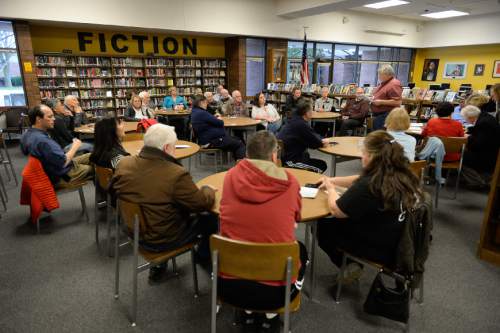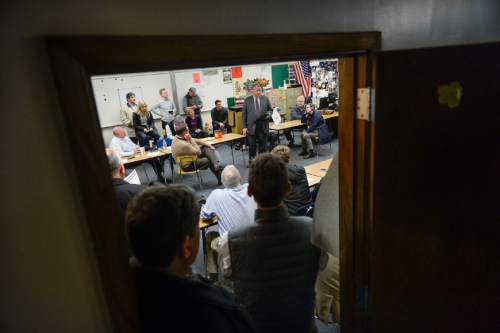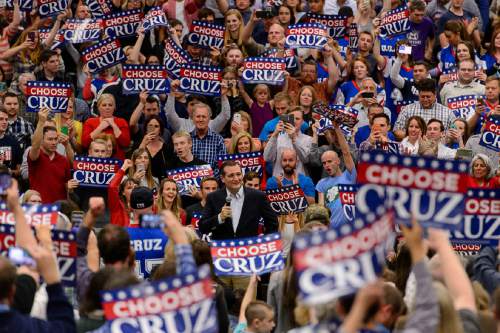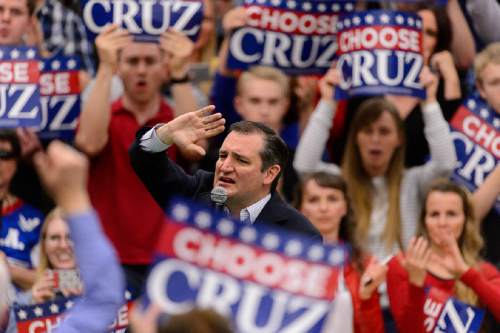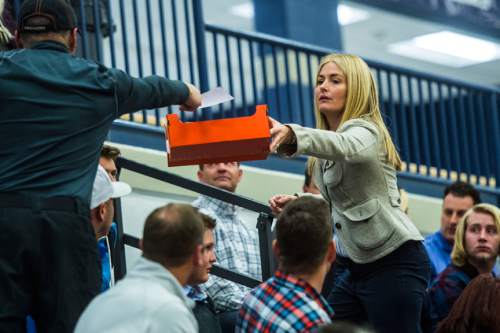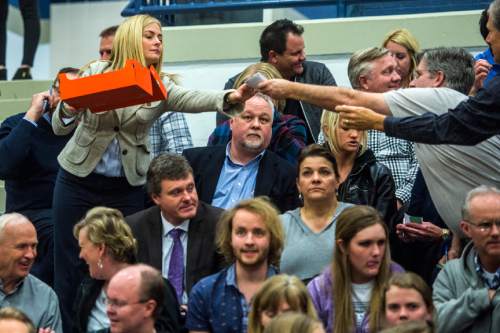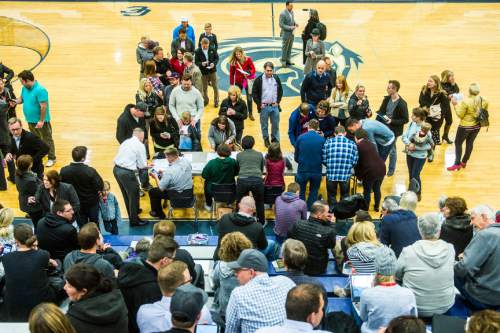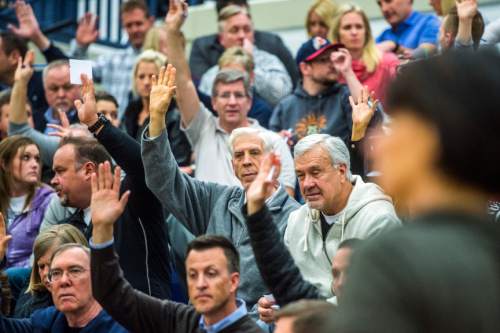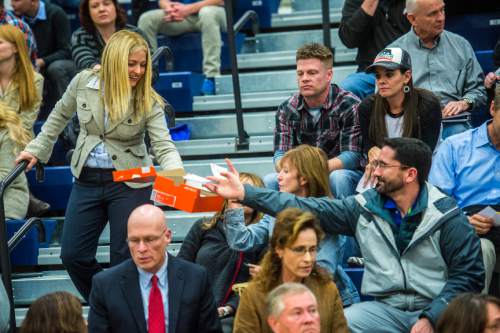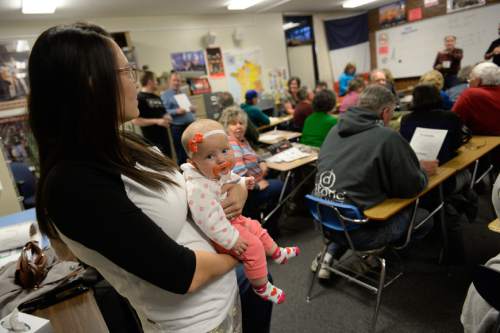This is an archived article that was published on sltrib.com in 2016, and information in the article may be outdated. It is provided only for personal research purposes and may not be reprinted.
Utah's Republican presidential nominating caucus may not have created major shifts in the complexion of the national race, but it could help set the stage for the final, pivotal weeks of the battle to decide the GOP's choice for a shot at the White House.
A day after his win in Utah, Texas Sen. Ted Cruz was portraying the nominating fight as a two-man race and said it is time for Ohio Gov. John Kasich to get out because it is "mathematically impossible" for him to win the race.
"You can't lose every state and expect to be the nominee," Cruz told CNN on Wednesday. "Right now, Kasich's role is really being a spoiler. Kasich benefits Donald Trump."
Utah may have been Kasich's best shot to re-energize a campaign that has seen just one victory — his home state of Ohio — in 29 contests.
Instead, Utah voters bent on stopping Trump and urged on by Mitt Romney dealt Kasich another setback. And perhaps even more disappointing was his showing in Arizona, where he finished fourth behind Florida Sen. Marco Rubio, who had already dropped out of the race. (Early voting, with many ballots cast before Rubio's departure, accounted for that unusual result.)
With votes in Utah still being counted Wednesday afternoon, Cruz had received 70 percent of support from the Utah caucusgoers, Kasich had 17 percent and Trump had 14 percent. Those percentages were unlikely to change much with about 10 percent of the ballots remaining to be tabulated.
The results were not what polling leading up to the caucuses foreshadowed. Pollsters from Y2 Analytics predicted Cruz would finish at 53 percent, just above the threshold he needed to win all of the state's 40 delegates; they had Kasich finishing with 29 percent.
Quin Monson, a founding partner with Y2 Analytics, said the numbers were close for Trump but voters shifted from Kasich and the undecided column to Cruz in the closing days of the contest.
"I think Cruz benefited from the idea that people maybe preferred John Kasich, but really didn't like Donald Trump," Monson said.
The poll itself could have driven some of the movement, Monson said, among voters who saw Cruz was close to 50 percent and jumped behind him to make sure he stayed over that important mark.
The Utah tide appeared to have begun to turn against Kasich on Friday when, during an appearance at Utah Valley University, Romney, the 2012 Republican presidential nominee, urged his supporters to back Cruz to defeat a candidate who has demonstrated "misogyny, bigotry, xenophobia, vulgarity and, most recently, threats of violence."
"At this stage, the only way we can reach an open convention is for Senator Cruz to be successful in as many of the remaining nominating elections as possible," Romney said in a Facebook post. The comments came just days after Romney had campaigned with Kasich in Ohio.
On Monday, Gov. Gary Herbert reiterated Romney's sentiment (also just days after he had appeared with Kasich at a Utah rally). And at the caucus in the Romney family's Holladay district Tuesday evening, Mitt Romney's son Josh said that "a vote for Kasich is a vote for Donald Trump."
State Rep. Kraig Powell, R-Heber City, who was the state chairman of the Kasich campaign, said it was clear that the anti-Trump sentiment in Utah and strategic voting by Utah caucusgoers hurt Kasich.
"The results show that Utah voters pay attention," Powell said. "[They] were well-educated and tuned in with first Mitt Romney and then Governor Herbert's indications that they would be voting for Ted Cruz in an attempt to deny Donald Trump any delegates, and that was an important influence in the minds of Republican caucus attendees."
It may ultimately prove a shortsighted calculation, Powell contends.
Now the Republican battle hits a lull, with just one contest — Wisconsin — in the next 27 days. Cruz and Trump are neck and neck there in the most recent poll, with Kasich trailing. The race then shifts to the North Atlantic region, with the New York primary followed by Connecticut, Delaware, Maryland, Pennsylvania and Rhode Island.
Those are states where Powell said a strong Kasich campaign could have been an asset to efforts to derail Trump — provided Cruz and Kasich united, rather than divided, the Trump opposition.
Despite doing poorly in Utah, Trump won the Arizona primary handily Tuesday and that state's 58 delegates. That leaves him with 739 delegates, compared with 465 for Cruz and 143 for Kasich. A total of 1,237 delegates are needed to win the nomination, meaning Trump would have to capture about 53 percent of the remaining delegates in play.
Cruz has a much steeper hill to climb, and Kasich can only hope to pick up enough along the way to deny Trump the nomination and, as he has tried to do, persuade delegates at a potentially brokered convention in July that he is the candidate with the best shot at winning in November. Recent polls have indicated he is the only candidate who could beat either Hillary Clinton or Bernie Sanders in a head-to-head matchup.
As for voter turnout Tuesday, the Utah Republican Party estimated that about 200,000 people attended its caucuses, demolishing the previous record.
About 24,600 also voted online in the party's first foray into Internet voting. Party Chairman James Evans said he considers the experiment a success and anticipates the online option will be used in years to come.
He also expects there will be an effort to keep Utah's presidential contest earlier in the year.
When the results matter, candidates are more likely to visit the state and voters are more likely to turn out to participate.
"I think there's going to be a sustained effort to make sure Utah is relevant in the presidential cycle from now on," he said.
Twitter: @RobertGehrke


